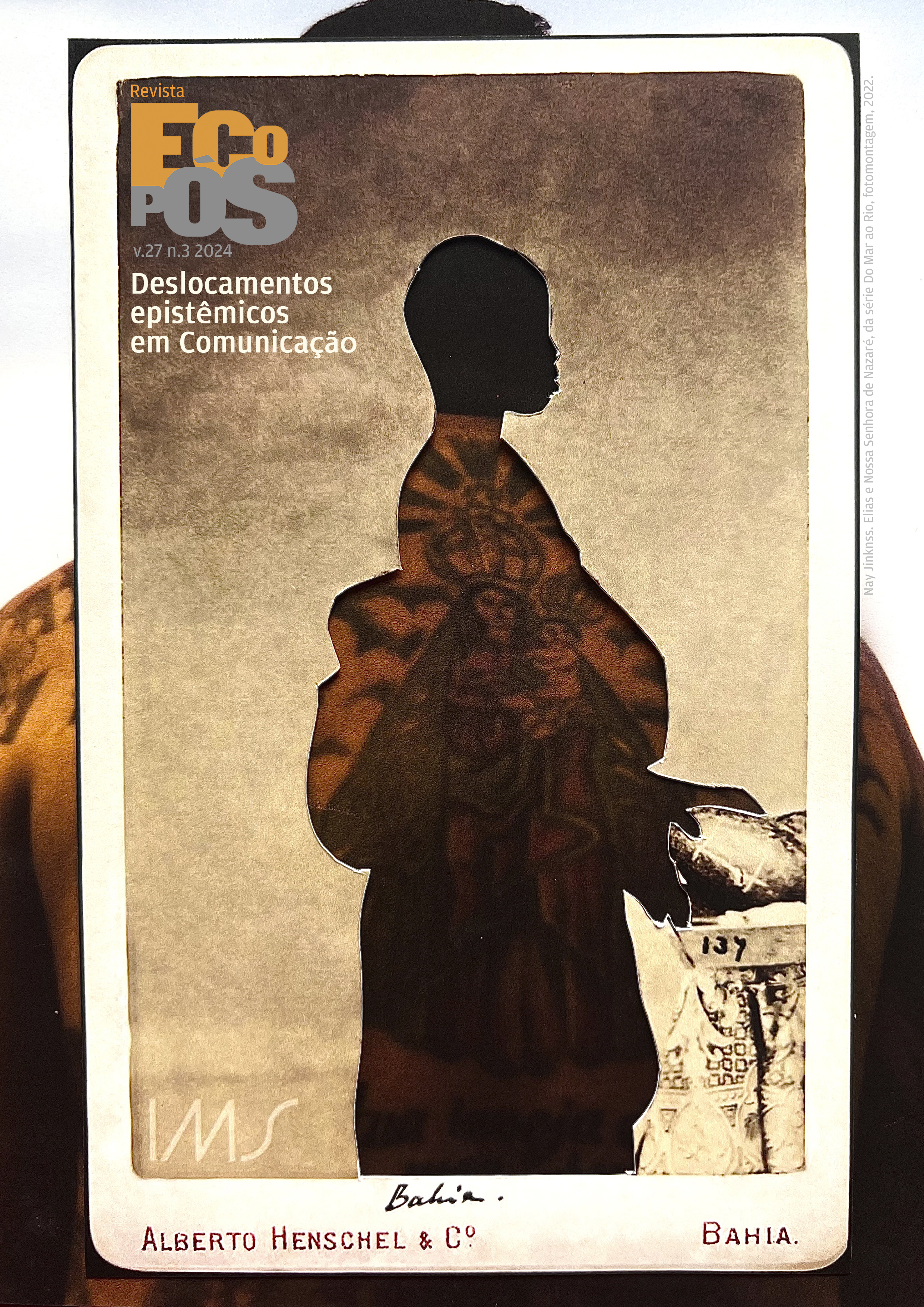Entre a cova e o berço
Modos de significação e trabalho na Roça do Futuro
DOI:
https://doi.org/10.29146/eco-ps.v27i3.28348Keywords:
Communication;, Counter-colonization;, Agroecology;, Language;, Landless Workers' Movement.Abstract
In this article, we reflect on the relationship between work and modes of signification, observing the metaphor "Roça do Futuro" and the opposition between the words "grave" and "cradle," used by the farmer Ivanilson Leal and his family, who live in the Assentamento Paulo Freire II, linked to the Landless Workers' Movement in the municipality of Estância/Sergipe. Through epistemological references that consider communication beyond the act of message transmission, we reflect on the ethical, technical, and aesthetic aspects produced in the experience. The methodology consisted of two meetings. In the first, we conducted an audiovisual recording in an interview/interviewee format, and in the second, we validated the results and made additions of content requested by them. The results point to the organic linkage between productive practices and modes of signification and constitute counter-colonial paths for thinking about new futures, both for the production of ideas and for the production of food.
Downloads
References
AGROECOLOGIA. Dicionário da Educação do Campo. Ver: Salet et al. (2012). Dicionário da Educação do Campo. Escola Politécnica de Saúde Joaquim Venâncio, São Paulo: Expressão Popular, 2012.
BARBOSA NETO, Edgar Rodrigues; SILVA, Natalino; LOWANDE, Walter. Estamos no começo do replantio das palavras”: uma conversa com Antônio Bispo dos Santos (Nego Bispo). PerCursos, Florianópolis, v. 24, e0601, 2023, p.1-16.
CASCUDO, Câmara. História da Alimentação no Brasil. 12. ed. São Paulo: Global, 2023.
CEFET-MG. Griot. No Dia do Contador de Histórias conhecemos o Griot. Publicado em mar. 2023. Disponível em: https://www.arteecultura.cefetmg.br/2023/03/20/no-dia-do-contador-de-historias-conhecemos-o-griot/#:~:text=Essa%20denomina%C3%A7%C3%A3o%20%C3%A9%20dada%20a,parte%20da%20cultura%20da%20%C3%81frica.
FONTES, Marília; RABANAL, Jorge; RAMOS FILHO, Eraldo. A roça do futuro: a construção da metodologia de Camponês a Camponês no Sul de Sergipe. Revista Geonordeste, a. XXIV, n.1, p.102-127, 2013.
FREIRE, Paulo. Extensão ou comunicação? 8. ed. Rio de Janeiro: Paz e Terra, 1983.
LUZ, Alexandrina; SOUZA, Fernanda. Alternativas de organizações nas comunidades rurais. In: Observatório Geográfico América Latina. In: Observatório Geográfico da América Latina. 2001. Online. http://www.observatoriogeograficoamericalatina.org.mx/egal8/Geografiasocioeconomica/Geografiarural/12.pdf Acesso em 10/06/2024.
SAF. Dicionário da Educação do Campo. Salet et al. (2012). Dicionário da Educação do Campo. Escola Politécnica de Saúde Joaquim Venâncio, São Paulo: Expressão Popular, 2012.
SANTOS, Antônio Bispo. Quilombos, modos e significados. Instituto de Inclusão no Ensino Superior, Brasília, 2015.
SODRÉ, Muniz. A ciência do comum. Rio de Janeiro: Vozes, 2014.
SODRÉ, Muniz. A sociedade incivil: Mídia, iliberalismo e finanças. Rio de Janeiro: Vozes, 2021.
SOUZA, Maria Sueli Rodrigues. Posfácio. Quilombos, Modos e Significados. Instituto de Inclusão no Ensino Superior, Brasília, 2015.
SHIVA, Vandana. Monoculturas da Mente. São Paulo: Gaia, 2003.
ZUCON, Pedro. A roça do futuro: agroecologia e campesinato em assentamentos de reforma agrária no território sul de Sergipe. (Mestrado em Desenvolvimento e Meio Ambiente), Universidade Federal de Sergipe, Aracajú, 2015.
Downloads
Published
How to Cite
Issue
Section
License
Copyright (c) 2024 Bruna Távora, Marcelo Rangel , Vinícius Oliveira

This work is licensed under a Creative Commons Attribution-NonCommercial-NoDerivatives 4.0 International License.
Aos autores pertence o direito exclusivo de utilização ou reprodução.
Você tem o direito de:
- Compartilhar — copie e redistribua o material em qualquer meio ou formato.
- Adaptar — remixar, transformar e construir sobre o material para qualquer filme, mesmo comercial.
O licenciante não pode revogar esses direitos, desde que você respeite os termos da licença.
De acordo com os seguintes termos:
- Atribuição — Você deve dar o devido crédito, fornecer um link para a licença e indicar se essas alterações foram feitas. Você pode fazê-lo de qualquer maneira razoável, mas não de maneira que sugira que o licenciante endosse ou aprove seu uso.
- Sem restrições adicionais — Você não pode aplicar termos legais ou medidas de natureza tecnológica que restrinjam legalmente outros de fazer algo que a licença permite.
Aviso: A licença pode não fornecer todas as permissões necessárias para o uso pretendido. Por exemplo, outros direitos, como publicidade, privacidade ou direitos morais, podem limitar a maneira como você usa o material.











